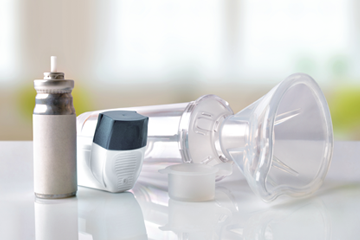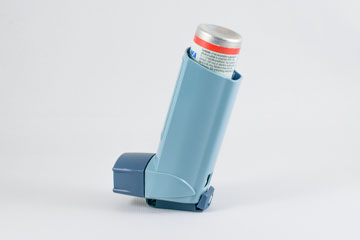Modern medicine is constantly evolving and offering solutions that definitely make our lives easier. To treat asthma successfully means to do more than control asthma symptoms. Effective treatment also improves our chances of experiencing future attacks and possible death, as well as improve our quality of life.9
Here are the main types of treatments you need to know about in order to fully understand your condition:

Controllers
Controller medication is also called preventive medicine, which protects the lungs and prevents asthma attacks from occurring. They reduce the swelling and mucus in your airways and reduce the narrowing of the airways. The treatments that come in an inhaler contains a low dose of corticosteroid and may include a “long-acting beta-2-agonist”.
These medicines are extremely safe at usual doses, as only very small amounts are absorbed from the lung. Doses of controller medicines are sometimes increased, or others may be added when your asthma symptoms get worse. Your doctor will tell you what medication changes are needed.4
Besides inhaler controllers, some treatments to keep asthma under control come in the form of an injection. These can either help the body control asthma by providing antibodies, or it could be antihistamines to reduce the allergic reaction to the trigger of your asthma symptoms. There are also oral treatments that will help control the inflammation in your lungs and keep them open. Some people may also require nebulised treatment (medicine delivered with a nebuliser).3
Read more about nebulisers and how it is used for treating asthma in the “Nebuliser” section.
You cannot become addicted to controller medicines for asthma even if you use them for many years.
They do not become less effective over time and so you should not be worried about them not working if you take them every day.
Never stop using your controllers, even if you become pregnant. Speak to your doctor first.4
Your controller inhaler may cause hoarseness, or a mouth infection called thrush. To reduce the chance of this happening, rinse your mouth after taking your controller inhaler.5

Relievers
Quick-relief medicines (“relievers”) are used to relieve minor asthma symptoms when they occur, as well as during an asthma attack, so this medicine needs to be with you at all times. The inhaler generally contains a substance called a “short-acting beta-2-agonist” or SABA for short. It relaxes the muscles around the airways to open them up again.3, 4
Some people will need corticosteroid tablets or injection as well when they have an asthma attack with severe symptoms to reduce the swelling.3
If you suffer from mild asthma or exercise-induced asthma, you may only need a reliever medicine and not a controller medicine. In the past, most reliever inhalers contained only a SABA, which relieves your asthma symptoms, but they do nothing to reverse the inflammation (swelling) in your airways. Some reliever inhalers contain both a low dose controller AND a quick-relief long-lasting medicine. They can be used both to relieve your symptoms and as your controller inhaler taken every day, to protect you from having asthma attacks.3, 4
Reliever medication is safe and has few side effects. Some relievers may slightly increase your heart rate or cause mild tremors but these side effects are temporary and should not cause concern.3, 5
Some people may become too dependent on their reliever medication and use it too often, which may be a sign of poor asthma control. Read more about asthma control in the “Controlled Asthma” section.